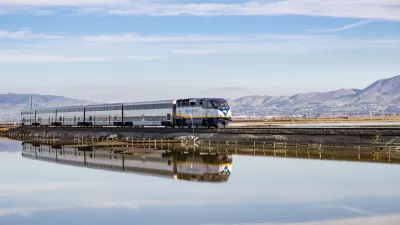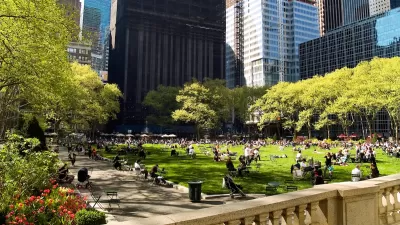The 1950’s and 1960’s were boom times for planning and building in the northeastern United States. Projects were designed and built seemingly overnight. For those who idolize Edmund Bacon (Philadelphia's director of city planning from 1949 to 1970) and Robert Moses (New York City’s master builder from 1924 to 1968), that was the time to plan and design and implement and build --quickly.
The 1950's and 1960's were boom times for planning and building in the northeastern United States. Projects were designed and built seemingly overnight. For those who idolize Edmund Bacon (Philadelphia's director of city planning from 1949 to 1970) and Robert Moses (New York City's master builder from 1924 to 1968), that was the time to plan and design and implement and build --quickly.
Two famous quotes from Robert Moses --"Once you sink that first stake, they'll never make you pull it up" and "Those who can, build, those who can't, criticize" -- sum up the attitude toward public process in those days. In other words, these guys built their reputations on getting something done. Bacon and Moses did not give much attention or credence to the public's reaction to a project until it was complete -- i.e., too late to matter.
But times change, and many recent projects have gone ahead and sunk that first stake only to have to pull it back up again. Projects drag on forever, according to many developers and public officials. The dreaded words are "permitting" and "entitlements." Those two seemingly small words multiply into months and years of endless public meetings, discussions, and negotiations about what to build and where to build it. Speaking at the recent London GRI World Summit, several fund managers lamented the cost of sinking their money into new building projects, as the time lag for getting projects approved and built is considered almost insurmountable in Europe and the United States. "Length of time to get entitlements" was mentioned, and not in a good way.
At the April 2007 World Cities Forum Shanghai, developers discussed enjoying a planning and permitting process that is relatively free from public consensus, much like our climate in the 1950's and 1960's. The only consensus the Shanghai developers need to start building is the approval of local government officials buttressed by the local academies. Projects are built quickly in China's superheated economy. To the question "Is the built project better?" comes the answer "It is always better than what was there."
But public comment is coming in China, like it or not. A recent New York Times front page photo, illustrating pre-Olympic development running roughshod over residents in Beijing, noted that "The standoff drew large crowds of angry neighbors who shouted at security guards." Certainly the Chinese people are realizing that they need to be part of the process. You can bet they will eventually find a way to make their preferences known before the demolition crews show up.
If we look back at our history, much of what Bacon and Moses built shaped the 20th century. The parks and housing and denser development all helped maintain both residents and density in Philly and New York, even as many other cities emptied into the suburbs. But the roads they built along their respective waterfronts are obviously in the wrong place and replacing them will be extremely expensive.
This is the question I find myself asking: Is it better to have a "building czar" than to design public consensus and take the public on an educational tour of the options available to them as they participate in planning their cities? We read again and again about the issues painfully facing the residents of New Orleans. I can't help but think that their zealous attempt to build what they want where they want--even though many consider it a long and cumbersome process and scream loudly for a building czar--is the way we had better get used to addressing development in our 21st century. The public will prevail.
But New Orleans will have to get started soon, because everyone who isn't building is criticizing--proving Moses right half a century later.

Planetizen Federal Action Tracker
A weekly monitor of how Trump’s orders and actions are impacting planners and planning in America.

Vehicle-related Deaths Drop 29% in Richmond, VA
The seventh year of the city's Vision Zero strategy also cut the number of people killed in alcohol-related crashes by half.

Can We Please Give Communities the Design They Deserve?
Often an afterthought, graphic design impacts everything from how we navigate a city to how we feel about it. One designer argues: the people deserve better.

Southern Californians Survey Trees for Destructive Oak Pest
Hundreds of volunteers across five counties participated in the first Goldspotted Oak Borer Blitz, surveying oak trees for signs of the invasive beetle and contributing valuable data to help protect Southern California’s native woodlands.

Opinion: How Geothermal HVAC Lowers Costs, Improves Grid Resilience
Geothermal heating and cooling systems can reduce energy costs and dramatically improve efficiency.

Tenant Screening: A Billion-Dollar Industry with Little Oversight. What’s Being Done to Protect Renters?
Reports show that the data tenant screening companies use is often riddled with errors and relies on information that has no bearing on whether someone will be a good tenant.
Urban Design for Planners 1: Software Tools
This six-course series explores essential urban design concepts using open source software and equips planners with the tools they need to participate fully in the urban design process.
Planning for Universal Design
Learn the tools for implementing Universal Design in planning regulations.
Borough of Carlisle
Smith Gee Studio
City of Camden Redevelopment Agency
City of Astoria
Transportation Research & Education Center (TREC) at Portland State University
City of Camden Redevelopment Agency
Municipality of Princeton (NJ)





























